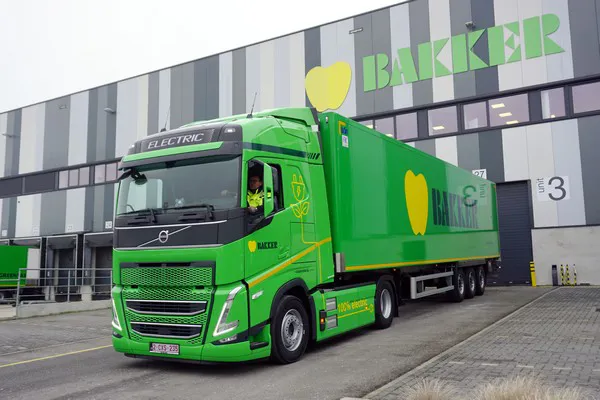Today is the first time that an e-truck will transport fresh fruit and vegetables from Bakker Belgium, a Greenyard company, to Delhaize. The new Volvo truck will deliver around 18,000,000 kilograms of fruit and vegetables to the retailer’s distribution centre in Zellik, every year. With this important step towards a sustainable fleet, Bakker Belgium will save 58 tonnes of CO2-emissions annually. The commissioning of the truck has been enabled thanks to the unique, integrated and long-term collaboration between both companies, reflected in a shared ambition to reduce CO2-emissions in the fruit and vegetable supply chain, also within their own operations.
Investing in a more sustainable supply chain
Driven by the clear ambition to continuously reduce their environmental footprint, both Bakker Belgium and Delhaize identified a significant upside in the 60 km route between Bakker Belgium’s distribution center in Boom and that of Delhaize in Zellik. A route that lends itself to the introduction of the first all-electric truck to further reduce CO2-emissions from its own operations. At both locations investments have been made in charging infrastructure. In Boom, this infrastructure is connected to 2,500 solar panels on the 15,000m² roof of the warehouse. This guarantees a steady supply of green energy, which is also used for the electric cooling of trailers on site, after being loaded with products.

“With this investment, we want to lead by example within our category; gain more experience and share our knowledge about e-transport with the rest of our supply chain partners. Because ultimately, we will need every link in the fruit and vegetable supply chain to achieve our sustainability goals.” said Adrie Bakker, General Manager at Bakker Belgium.
Sustainability as a key factor in a strategic, long-term partnership
CO2-reduction is an inherent part of both Greenyard’s, Bakker Belgium's and Delhaize’s sustainability strategy for a better planet. Greenyard’s sustainability ambitions are captured in the Group’s sustainability roadmap and cover amongst others climate change and reducing the company’s carbon footprint. The group will reduce its direct CO2-emissions with 50% by 2025, and with 70% by 2030. Moving towards more sustainable ways of transport is a driver of these ambitions. The investment in this first electric truck directly contributes to them and offers a perfect solution for this specific trajectory.
"Sustainability is an important pillar in our closely aligned strategies. Fruit and vegetables already are the most sustainable food category around. Making our own operations and transport more sustainable is part of a multi-year plan to reduce emissions from our operations. Today we reach a milestone with our first e-truck carrying fruit and vegetables from our site to Delhaize's DC in Zellik. We expect that the new truck will cover almost 90,000 kilometers annually. That’s as much as around the world and back again," continued Adrie Bakker.
Delhaize shares this ambition. Therefore, the Belgian retailer and their strategic partner Bakker Belgium work intensively together to reduce their CO2-emissions, together with all the fruit and vegetable supply chain partners. This should result in a reduction of Delhaize’s indirect emissions (scope 3) in the supply chain with 40% by 2030.
“Doing the best we can for our planet every day is a top priority for Delhaize. We are convinced that good cooperation between the various parties that are part of the supply chain, can lead to the greatest successes. Not only do we impose strict standards on ourselves, we are also high-demanding towards our suppliers and partners. We ask each of them to present us their carbon footprint and a reduction plan. We are therefore very pleased with the efforts and investments that Bakker Belgium is making to drastically reduce their CO2-emissions and to achieve their objectives. We are absolutely proud of our collaboration," says Johan Ideler, Senior VP Logistics & Supply Chain at Delhaize.
Finally, Minister for Mobility and Public Works Lydia Peeters, states: "In Flanders, as much as 40% of the total CO2-emissions of the transport and mobility sector, are linked to trucks. Making this sector greener is therefore a major challenge, and fortunately there has been progress in this area in recent years. Major technological steps are being taken towards zero-emission transport, especially towards electric driving. From Flanders, we are looking at how we can further facilitate the roll-out of e-trucks and the necessary charging infrastructure in the future. I applaud Bakker Belgium and Delhaize for making this investment and thus taking a pioneering role in making logistics more sustainable."
For more information:
Janneke Goudswaard
Bakker
Tel: +31 180 69 59 11
Email: [email protected]
Cedric Pauwels
Greenyard
Tel: +32 15 32 42 00
Email: [email protected]










